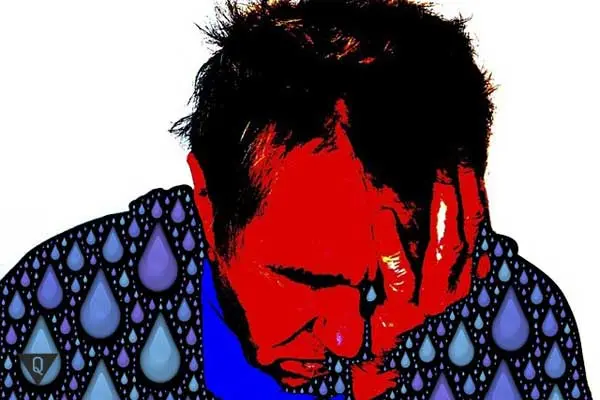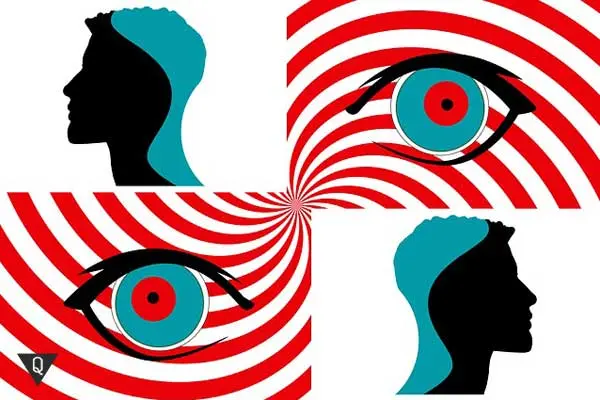Contents
We are glad to welcome you, dear readers of the site! Agitated depression is one of the most common types of disorders in the classification of depressive states.
And today we will try to figure out exactly how it manifests itself, for what reasons it arises, and, importantly, we will study ways that will help to heal and restore peace of mind.
What is it like?
Agitated depression is essentially anxiety mixed with sadness. States replace each other, manifesting themselves in the form of episodes.
For example, when anxiety occurs, a person feels that danger is approaching him, or something threatens his relatives, but the nature of the anxiety is uncertain.
That is, there seems to be a threat, but what and from where exactly is not clear. Which makes it really scary. After all, there is no way to prepare, to strengthen your borders. Accordingly, the body is in constant tension and has no resources to live through a whole range of emotions.
Usually, anxiety appears when a person begins to think about the future. Then fantasies that a child at school will choke on food or one of the parents will be hit by a car are so captivating that a panic attack may well begin.
And until there is accurate information that everything is in order with loved ones, peace will not come.
But sadness makes itself felt when remembering the past. For example, when a person is engaged in “self-digging” and begins to think about lost opportunities. Now, if 10 years ago I had chosen another family partner, then life would now be beautiful and cloudless.
There is little energy in sadness and nostalgia; therefore, a person with agitated depression seems melancholic, completely indifferent to his fate and what is happening around him. But as soon as an episode of anxiety occurs, how he becomes fussy and overly active.
Main signs and symptoms
If you feel sad or unable to sit still while one of your relatives is flying to another country, this is not the time to panic, thinking that agitated depression has overtaken you.
Although the danger of this disorder lies precisely in the fact that at first it is difficult to detect and diagnose it.
Let’s look at the main signs, noticing which, you will understand that it is time to seek help from specialists.
- Attacks of uncontrolled anxiety occur most often in the evening. Especially at the moment when a person turns off the TV, the light and is left alone with himself and his thoughts. Which unfold vigorous activity in the head, provoking insomnia. He does not understand why he is worried, but his chest becomes so uncomfortable that he involuntarily has to look for the cause of his feelings, remembering various unpleasant events that frighten and upset even more.
- Some ideas may be delusional. Suppose a person with financial well-being is horrified at night at the thought that suddenly tomorrow she will have nothing to buy food for, which will gradually lead to a starvation and painful death. Therefore, in such cases, he tries to save on everything and stock up on food, as if a war will break out soon.
- Limitation of social contacts. A person with this disorder is preoccupied with issues that may not be clear to his environment. Yes, and interest in communication disappears, it is easier for him to be alone, or with those who are ready to listen to his stream of thoughts and accept him as he is now.
- The mood becomes depressed, and not for one evening, but for a long time. The patient may experience, for example, joy, but basically he is depressed and as if immersed in himself.
- Former hobbies and hobbies no longer attract as much as before. There is indifference to what has always excited, relaxed or given pleasure.
- The speech becomes fast, as if if he does not have time to say something now, he will never say it again. It happens that he interrupts the interlocutor and begins to speak on a topic completely far from their general conversation. Often thoughts are fragmentary, pronounced out of place and as if into the void, without a clear addressee. By the way, he repeats them several times in a row, as if forgetting that he had just said them out loud.
- Eating disorders are often characteristic symptoms of agitation. Let’s say there is a complete or partial refusal to eat, as the appetite has disappeared, or vice versa, free time is devoted to the process of absorbing various dishes. Therefore, if you notice changes in diet and habits, along with other signs, be sure to contact a medical institution at least for a consultation.
- Other accompanying disorders make themselves felt, for example, obsessive-compulsive disorders, phobias. The patient stops going out, he may develop certain rituals that help to cope with anxiety, or he is terribly afraid of being alone, demanding that someone from the family is always there, even at night.
- Given changes in eating behavior, a person with this type of depression also changes in body weight. He either loses a lot of weight or gains extra pounds. In any case, this is reflected in his physical well-being. Why there is shortness of breath, heart problems, pain in the gastrointestinal tract, and so on.
Causes

existential crisis
When a person is engaged in rethinking his life, summing up — this often causes him disappointment, annoyance and sadness. That quite threatens to be the trigger mechanism for the emergence of agitated depression.
Age complicates the situation. If at such a moment of awareness a person is, so to speak, in the prime of life, an existential crisis may not happen. Since, summing up, there is a chance to make adjustments to future plans, priorities and goals.
But it’s not easy for older people. Because in this case, they are literally forced to admit that, for example, they did not dispose of a large segment of their life as they wanted, but there is no time to fix everything and start anew.
Moreover, young people are usually socially active and rarely experience a lack of communication, attention, and so on. What can not be said about pensioners, single people, careerists. They simply sometimes have no one to share their experiences with.
And then, naturally, thoughts about their insolvency, wrong choices and even desires creep in.
Dissatisfaction
A person may not be in a crisis, but at the same time experience dissatisfaction with his life. For example, if there are difficulties at work, with finances, in the family and even in friendships.
It is clear that agitation will not occur in one day, but if you are in a depressed mood for a long time, when nothing that does not suit you does not change, then there is a high risk of exhausting the body’s resources.
Character accentuations
These are personality traits that remain virtually unchanged throughout life. Except when a person is working hard on himself and his limitations, learning to react differently to various stimuli and events.
For example, there are anxious people, and no matter how they try to feel calm, any change in the external environment will cause them anxiety, and even panic.
There is also a stuck personality type, such a person remembers grievances for a long time, accumulates them, not understanding how one can be distracted by other events that are more pleasant and joyful.
In general, if you look at the world with sadness and distrust, then it is likely that one day the nervous system will fail.
You will learn more about the existing character accentuations from this article.

Genetic predisposition
Scientists believe that the tendency to mental disorders is often inherited. In addition, if there was a person with this disease in the family, the child could simply adopt stereotypes of behavior and reactions to various events from him.
By copying the habits of a significant adult, the baby is thus trying to understand the structure of the world and his place in it.
And, of course, seeing how mom or dad often rushes from corner to corner in a panic, fearing everything, decides that it’s really not safe around and also begins to worry for any reason, or even without it.
Psychological trauma
Any event that causes a surge of emotions is a burden on the nervous system. Even joyful meetings and surprises sometimes bring health problems.
What can we say then, if you have to live through grief in connection with the death of loved ones, significant people, a break in relationships, dismissal from work and other extremely unpleasant moments.
The psyche sometimes cannot cope with the flow of tension, which is why even the slightest troubles can leave a deep mark on the personality structure.
For example, after learning about the betrayal of a partner, a woman ceases to trust men, treats them with disdain and does not expect anything good in relations with them.
Accordingly, she will not realize her needs, which will subsequently provoke the occurrence of this disorder. She will either fall into despondency, experiencing disappointment and sadness, or suddenly become overly restless, trying to still find the one who will not betray.
And these episodes of anxiety and sadness will follow each other until her health worsens at all, and she gets to qualified specialists for an appointment.
Treatment

Treatment is prescribed after the diagnosis. The person must first be tested for the presence or absence of the disorder.
Typically, the Taylor test is used to measure the level of anxiety, Zung (depression), as well as the Luscher method, which allows you to find out the general psychological mood.
Psychotherapy
Regardless of the cause of this mental illness, you should definitely undergo a course of psychotherapy. You will determine the number of meetings together with the therapist to whom you will contact.
It is impossible to change the quality of life without changing personally. Therefore, it is important to explore your resources and limitations, to find those “stones” that you “stumble” over and are unable to move forward.
As well as ways by which you will be able to fulfill your needs without destroying the world around you, and, importantly, within yourself.
Healthy lifestyle
Go in for sports first. Which you will master without harm to health. It would be better if you start with running and swimming.
Physical activity helps to cope with stress, get rid of accumulated tension and feel joy, pleasure, and even happiness against the background of the activation of hormones such as dopamine, oxytocin, serotonin and endorphin in the body.
Quality sleep will also help to relax the nervous system and help restore resources, improve well-being and mood. Make sure to go to bed before 12 at night and sleep at least 8 hours.
If you have insomnia, ask your doctor to prescribe sleeping pills. And also follow the recommendations given in this article.
Limit the use of alcohol and other substances that adversely affect health, causing addiction. For a short period of time, you may experience relief, but in the future, well-being will only worsen. And then, in addition, you will also have to cope with addiction.
Consultation of a neurologist, psychiatrist
This is necessary in order, firstly, to confirm or deny the presence of this disorder. And secondly, get a prescription for sedatives, if it is really diagnosed.
Although there is a stereotype in society that depression suffers from idleness and those who do not know how to enjoy what they have, it is still a disease. Which requires medical treatment. And not just attempts by the power of thought to cause a good mood.
So accompanying drug therapy is sometimes mandatory, especially if the condition is either anxious or apathetic and there is a long period of time.

secondary benefit
This method is not easy and usually causes rejection among those who are offered. But it is quite effective, especially in cases where there is no positive dynamics in treatment for a long time.
And it lies in the realization of what benefits the disease gives us, in particular agitation.
After all, it often happens that a person does not realize what pleasant bonuses his illness, unpleasant events in life, and so on give him. Why does not make any attempts to correct what does not suit and destroys his health.
For example, have you met people who complain about low wages, but at the same time are not actively looking for another job, limiting themselves only to words about how they suffer and need everything?
Yes, indeed, sometimes life is not easy for them, but in this way they satisfy their need for attention and care.
And if it turns out that everything changes and they take a position, thanks to which they will become wealthy, then you won’t get pity from others. On the contrary, there will be more demands and obligations.
So, despite your resistance to admitting that your disease may be beneficial, try to write at least 3 of the so-called dividends that “arrive” due to excessive anxiety or apathy.
Then analyze in what other way, less destructive, you could realize those needs that are not so naked due to depression?
For example, you have fewer responsible affairs, troubles, problems, more attention and care, or vice versa, you are tired of society, and such a state justifies the desire to retire to itself.
Completion
And that’s all for today, dear readers! For more information about existing treatments for this disorder, see this article.
And share in the comments your ways that helped relieve anxiety and feel joy, or at least calmness, when you realized that there was no mood from the word at all and for a long time.
It is likely that your experience will be useful to those who have been in a similar situation. After all, support is an important element on the road to recovery!
Take care of yourself, be healthy and happy!
The material was prepared by a psychologist, Gestalt therapist, Zhuravina Alina









